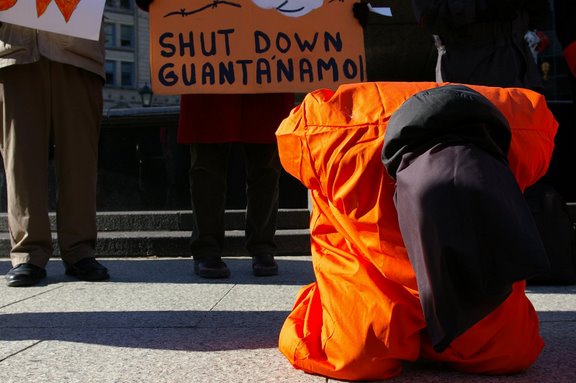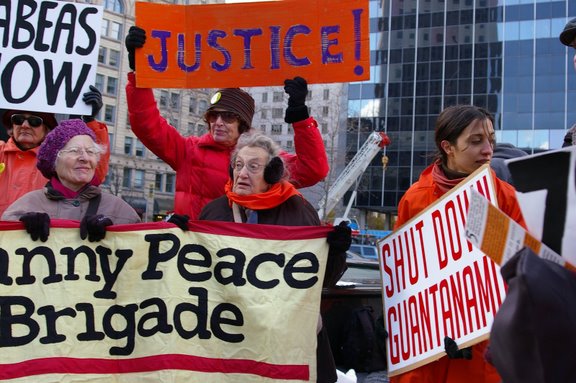Torture Tapes Aside, Who Will Prosecute the Actual Torturers?
Posted by stoptorture on 18th December 2007
On December 10, 2007, International Human Rights Day, the 59th anniversary of the Universal Declaration for Human Rights, John Kiriakou, a former CIA agent, stepped forward on national television to tell us that the CIA tortures and torture works. Normally more responsible, ABC News’ Brian Ross conducted the uncritical interview (more like “chat“) with Kiriakou and called him a “whistleblower,” despite his Mukasey-like lack of commitment demonstrated in phrases like “waterboarding, at least right now, is unnecessary.” (see Mukasey’s declaration on the Torture Memo: “It was unnecessary.”). Unfortunately: the only whistle that torture apologist Kiriakou blew was the one used to attract attention to get himself a book deal.
Was there an unequivocal cry of “Shame!” and a demand for accountability after Kiriakou’s revelations? No. Far from it. The New York Times, for its part, did a sympathy piece for the CIA torturers. In it, journalist Scott Shane took care to remind us of the highly relevant fact that Kiriakou is a father of four (of course, there is no mention of, for instance, Maher Arar, tortured innocent man and father of two). In other words, he has others to support in this time of need when, as Harvard law professor and former OLC head Jack Goldsmith says in horror, family men like him might see their reputation destroyed, their careers lost! Such harsh punishment for simply engaging in war crimes condemned for centuries? Have a heart, people.
Thankfully for the career torturers, the government has one. It’s dug deep to find the same one that was lying unused since the President commuted Scooter Libby’s sentence. This is clear because a week has passed, and no one with authority in government has suggested the obvious:
THOSE WHO AUTHORIZED OR DID THE TORTURE DESCRIBED BY KIRIAKOU SHOULD BE PROSECUTED.
Instead, the focus is conveniently on the destruction of the videotapes of the torture. Type in the words “CIA” and “investigation” into Google news search, and you will find thousands of hits about the torture videos’ destruction. Now, obstruction of justice is serious and should be investigated. But what about the torture itself?!?! Even a Reuters article titled, “Lawmakers Launch Waterboarding Investigation” is actually about the start of inquiries into the CIA torture tapes destruction.
It’s the Abu Ghraib scandal spin all over again, and we’re falling for it. In the case of Manadel al-Jamadi’s homicide while in CIA custody, remember that the prosecution was of the two low-ranking Abu Ghraib soldiers who posedin the photographs of his dead body wrapped in ice. Their crime? Taking the pictures. (See “Ghosts of Abu Ghraib”). But Mark Swanner, the CIA agent who, along with Navy SEALs, reportedly killed Manadel al-Jamadi and then attempted to cover up the crime, walks free today. Former US Attorney Paul McNulty, infamous for his role in the attorney firing scandal, was in charge of prosecuting al-Jamadi’s homicide and never brought it forward.
Not only is the torture itself not being investigated, the CIA is weighing whether to prosecute Kiriakou for talking about the torture. And to top it off, the Attorney General who couldn’t bring himself to say that waterboarding is torture is now in charge of an investigation about the destruction of evidence of waterboarding. Hurray for justice!
Moreover, Mukasey has told Congress he will not cooperate with its investigation for fear of appearing political (sigh) and has asked it to be stopped. Nice work Schumer and Feinstein. An A+ to the Senate for picking that defender of the law as Attorney General. Excellent job to all the senators running for president, who didn’t even show up to vote against Mukasey (i.e. McCain, Clinton, Biden, Obama, and Dodd).
With news like this, who needs satirists? Writers’ guild stay on strike. We have no need for Stewart and Colbert. Anyone can connect the dots. Raw hipocrisy is being churned out, live and unedited. Then again, at least Stewart and Colbert make us laugh. And none of this is funny.
[UPDATE: Today, the Center for Human Rights and Global Justice at NYU Law School released a report with testimony Mohamed Farag Ahmad Bashmilah, a torture survivor with personal knowledge on conditions within CIA black sites. Who will call for justice? It’s more than the tapes; it’s the torture.].
Posted in Human Rights, International Law, Torture, U.S. Law | 87 Comments »

